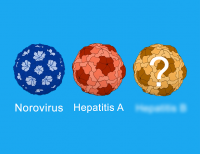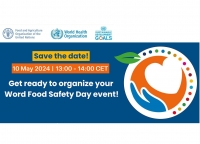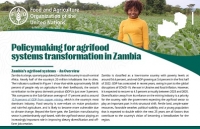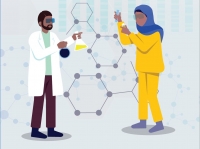News

08/05/2024
Viruses are the tiniest of microbes, but that doesn’t mean they should be underestimated as a significant threat. While they do require a host to multiply, they can still survive in the environment, including in food, until encountering a victim. Contaminated food can find its way into our refrigerators and meals, and as a result, viruses find their way into our bodies, often causing unpleasant illness or, at worst, death. But there are things that can be done to prevent that from happening. CODEX developed the Guidelines on the Application of General Principles of Food Hygiene...

07/05/2024
World Food Safety Day is only 1 month away! Join us on 10 May for the World Food Safety Day Planning Webinar if you're interested in organizing an event or activity to raise awareness about food safety.
From 13:00 to 14:00 CEST, representatives from the FAO, WHO, and the World Food Safety Day team will guide you through this year's theme, "Food safety: prepare for the unexpected." Discover strategies to raise awareness and inspire action to prevent, detect and manage foodborne illness. Plus, get your questions answered by the experts.
While you wait, explore the World Food Safety Day Communications Toolkit, available...

02/05/2024
Cette semaine, la FAO a lancé un projet visant à améliorer le système de contrôle alimentaire à Djibouti. Un projet de 6,4 millions d'euros financé par l'Union européenne, «Renforcement des capacités et de la gouvernance en matière de contrôle alimentaire et phytosanitaire», a débuté en novembre 2022 pour fournir un soutien technique et travailler avec les autorités compétentes et d'autres institutions de premier plan dans 12 pays du Marché Commun pour l'Afrique Orientale et Australe (COMESA) pour renforcer leurs capacités, renforcer la gouvernance et améliorer la planification stratégique autour de deux composantes principales : la sécurité sanitaire des...

29/04/2024
The transformation towards more sustainable agrifood systems calls for innovative policy and institutional coordination mechanisms. In this context, the exchange of experiences among countries becomes essential.
A new brief entitled Policymaking for agrifood systems transformation in Zambia provides an overview of the country’s advances in agrifood policy coordination, governance mechanisms and multistakeholder engagement, as well as the importance of investments for more sustainable agrifood systems. The brief also highlights key socioeconomic, food security and nutrition, and environmental indicators, along with the pivotal policies guiding Zambia’s vision to become a regional breadbasket.
“This brief is an important document produced by FAO which provides...

22/04/2024
The latest advancements in cell-based food production and precision fermentation that were shared at the stakeholder meeting held in Shanghai, China, in November 2023 have been published in the report, Cell-based food and precision fermentation – Products, safety and the future role. The meeting was a follow-up of the first stakeholder meeting held in Israel in 2022, that has been summarized in the previous report, Cell-based food: its safety and its future role.
The newly published FAO report of the 2023 meeting offers an in-depth exploration of the relevant innovations, providing readers with...

16/04/2024
An online event will take place on Thursday, 9 May 2024 from 14:30 to 15:30 CEST via Zoom. Based on the recent FAO publication, the webinar aims to stimulate discussion on the food safety aspects that need to be considered and addressed when using environmental inhibitors in agrifood systems.
The challenge of feeding an increasing global population while responding to the climate crisis requires developing practices and technologies that enhance the sustainability of food production.
“Among the approaches that are being developed to increase the sustainability of agrifood systems, environmental inhibitors help reduce negative impacts on the environment while improving the production...

29/03/2024
Over a thousand participants from more than 75 countries joined the landmark publication launch webinar on food safety aspects of cell-based food, jointly organized by the Food and Agriculture Organization of the United Nations (FAO) and the World Health Organization (WHO) in April 2023. This strong turnout underscores the rapidly growing interests in the topic of cell-based food.
This week, FAO has released the joint report of the webinar, which provides a comprehensive summary of the discussions that took place during the webinar. This webinar touched upon various aspects of the topic, including regulatory activities that are related...

25/03/2024
A new report on the safety and regulatory aspects of cell-based food in the Near East region has been published in March 2024. The publication reports a side event organized by the Food and Agriculture Organization of the United Nations (FAO) and the World Health Organization (WHO) on the occasion of the 11th Session of the FAO/WHO Coordinating Committee for the Near East (CCNE11) held in September 2023. Fifty-three participants from Near East countries attended the meeting, with eighteen in-person and thirty-five online attendees.
The report summarizes the discussions held at the event, including the information on...

18/03/2024
Do all processed foods and ingredients derived from foods known to cause allergies need to be labeled as such, even though allergen-causing components of the foods may have been altered during processing?
The ad hoc joint FAO/WHO expert consultation on risk assessment of food allergens released part 4 report that addresses this question and describes a framework for government authorities or food business operators to consider when or if exempting these foods from allergen labeling would be acceptable.
Allergens in foods are primarily made up of proteins. When foods are processed or refined, the protein structure...

12/03/2024
Earlier this month, FAO began an assessment to improve the food control system in Egypt. The 6.4-million-euro project, "Strengthening of Capacities and Governance in Food and Phytosanitary Control” project, funded by the European Union (EU) since December 2021, is providing technical support and working with Competent Authorities and other leading institutions in 12 African Union member countries to build up capabilities, strengthen governance and improve strategic planning around two main components: food safety and plant health.
Following a recent extension granted by the EU, Egypt has become one of the two additional beneficiaries of the project,...
Stay up to date and connect to our RSS feed!
